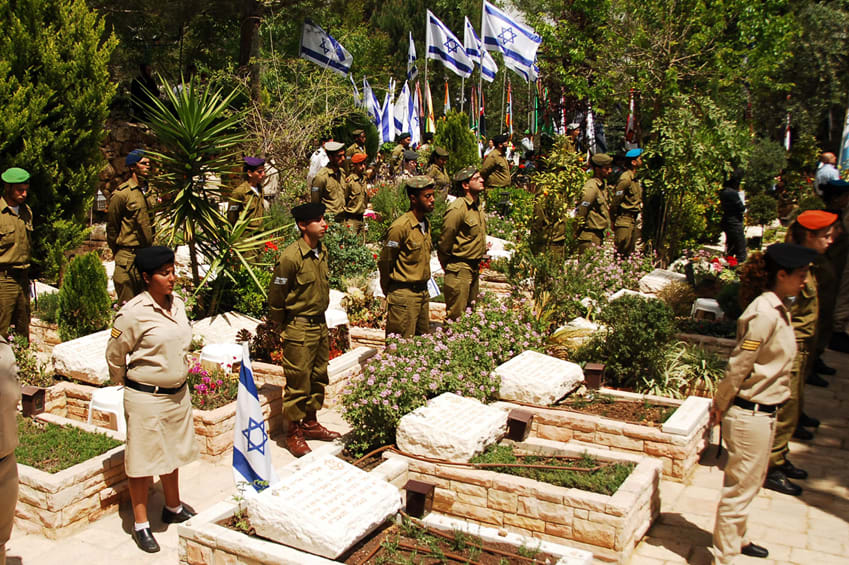Immediately after Pesach, up until Yom Ha’atzma’ut, it is heartwarming to witnesses the unfurling of the Israeli flag in front of government buildings, businesses as well as private homes, while on many street corners young people can be seen selling flags to be affixed on to car windows. How very disconcerting it is to hear that, in certain neighborhoods, young people of the same age may be found defacing these very same flags. One wants to shout: “Even if you do not feel a sense of loyalty to the flag and what it represents, at least show some hakarat hatov to the soldiers who gave up their lives defending their land and people!”
In an essay written many years ago, Rav J.B. Soloveitchik spoke to this issue: “If you ask me, how do I…look upon the flag of the State of Israel, and has it any halachic value? — I would answer plainly… in the Shulchan Aruch (it says): “One who has been killed by non-Jews is buried in his clothes, so that his blood may be seen and avenged… In other words, the clothes of the Jew acquire a certain sanctity when spattered with the blood of a martyr. How much more is this so of the Blue and White flag, which has been immersed in the blood of thousands of young Jews who fell in the War of Independence, defending the country and the population… It has a spark of sanctity that flows from devotion and self-sacrifice. We are all enjoined to honor the flag and treat it with respect.” (Rabbi Soloveitchik, Five Addresses, p.139).
Rav Soloveitchik’s appreciation of the soldiers’ self-sacrifice was mirrored by other Roshei Yeshiva who did not share his own political affiliation with Religious Zionism. In a talk before his students during the Yom Kippur War in 1973, reprinted in his “Sichos Mussar,” the Mirrer Rosh Yeshiva, Rav Chaim Shmulevitch, likened the IDF soldiers to “Harugei Lod,” the martyrs of Lod, of whom the Talmud (Baba Batra 10b) states that: “No person is worthy of standing in their presence.” He demanded that his students appreciate the fact that their debt to these soldiers was limitless, and that they pray extensively on their behalf.
Rabbi Ari Kahn has beautifully retold the following story regarding Rav Yisroel Zev Gustman from which I present a small selection: “The year was 1982. Once again, Israel was at war. Soldiers were mobilized, reserve units activated… On the eve of the 19th of Sivan, in particularly fierce combat, Shlomo Aumann fell in battle. …On the way back from the military cemetery, Rav Gustman turned to another passenger in the car and said, “They are all holy… every single one of them.” He then turned to the driver and said, “Take me to Professor Aumann’s home.” …Rav Gustman entered and asked to sit next to Professor Aumann… “I am sure that you don’t know this, but I had a son named Meir… (who) was taken from my arms and executed… My Meir is a kadosh — he is holy — he and all the six million who perished are holy.”
Rav Gustman then added: “I will tell you what is transpiring now in the World of Truth in Gan Eden — in Heaven. My Meir is welcoming your Shlomo into the minyan and is saying to him, ‘I died because I am a Jew — but I wasn’t able to save anyone else. But you, Shlomo, you died defending the Jewish People and the Land of
Israel’… Rav Gustman continued: “I never had the opportunity to sit shiva for my Meir; let me sit here with you just a little longer.”
Professor Aumann replied, “I thought I could never be comforted, but Rebbi, you have comforted me.”
That is why it is so troubling that in some shuls they refuse to recite the prayer for our soldiers. Those who refuse to serve in the army cannot also refuse to pray for the well-being of those who lay down their lives in their defense!
To conclude on a personal note: Many of you may already be too old to enlist in the IDF yourselves, as I discovered to my dismay after making Aliya. However by coming, and raising your children here, you too may experience the nachas of seeing your children don uniform and actively take part in defending G-d’s land and people.
Rabbi Yerachmiel Roness of Ramat Shiloh, Beit Shemesh is an NCSY alumnus and writes the weekly “Chizuk v’Idud” column in Torah Tidbits, the weekly publication of OU Israel, where this article first appeared.
The words of this author reflect his/her own opinions and do not necessarily represent the official position of the Orthodox Union.
